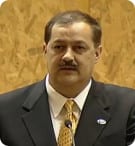Blankenship Indictment Isn’t a Conviction
It’s too early to be measuring Don Blankenship for a prison-striped suit. He was the odious Massey Energy CEO in April 2010 when the company’s Upper Big Branch (UBB) coal mine in Raleigh County in southern West Virginia exploded and killed 29 miners. Blankenship faces federal charges that could put him in jail for the rest of his life. But that’s far from assured.
A federal grand jury in Charleston, W.Va., Nov. 10 indicted Blankenship, 64 and now retired from Massey, on four criminal charges related to the mine disaster: conspiracy to violate federal mine safety rules, conspiracy to impede federal mine safety inspectors, lies to the U.S. Securities and Exchange Commission, and securities fraud. Blankenship entered a not guilty plea soon after the indictment. The charges carry a potential sentence of 31 years in jail.
The 43-page grand jury indictment is scathing. “Throughout the indictment period [Jan. 1, 2008 through April 9, 2010],” it reads, “Blankenship himself closely managed UBB, the coal from which was critical to Massey’s financial performance. Blankenship knew that UBB was committing hundreds of safety-law violations every year and that he had the ability to prevent most of the violations UBB was committing. Yet he fostered and participated in an understanding that perpetuated UBB’s practice of routine safety violations, in order to produce more coal, avoid the costs of following safety laws, and make more money.”
Outgoing Sen. Jay Rockefeller (D-W.Va.) said after the indictment that as Blankenship “goes to trial, he will be treated far fairer and with more dignity than he ever treated the miners he employed. And, frankly, it’s more than he deserves.” His trial is scheduled to start Jan. 26.
But the case may never get to that point. It’s important to remember than indictments are one-sided actions, in which a prosecutor makes a case and the defendant is absent. The cliché has it that a good prosecutor “could indict a ham sandwich.” It’s a cliché because it is useful: indictments are notoriously easy. Trials are hard. Blankenship will have the best representation money can buy (and he has a lot of money). His legal team will put the prosecution to a harsh test.
Often, prosecutors get grand jury indictments in order to pressure a defendant into a plea bargain. That may be the case here. The government may be pushing to get Blankenship to agree to a lesser crime in order to avoid jail time.
Sometimes U.S. Attorneys have political motives behind cases they bring. Is that the case here? It’s hard to tell. U.S. Attorney for the Southern District of West Virginia Booth Goodwin, 43, has a Democratic pedigree. Obama appointed him in 2010. His father was a Clinton appointee as a judge in the U.S. District Court for the Southern District of West Virginia in 1995. A cousin, Carte Goodwin, served briefly as a Democratic U.S. Senator after the death of party icon Robert Byrd in 2010. His wife, Amy Shuler Goodwin, was a spokeswoman for two Democratic governors, Bob Wise and the incumbent, Earl Ray Tomblin.
West Virginia has become a dependable Republican state of late, largely as a result of the Obama administration’s policies toward coal. But Blankenship, a hard right Republican, is anathema to the state’s coal miners, who have deserted the Democratic Party in droves recently. Bringing Blankenship down could help if Goodwin has political ambitions.
Contemplating the indictment and the politics of West Virginia, lawyer-guru Jeffrey Toobin in the New Yorker scratched his head over the precipitous fall of a long-ascendant Democratic Party in West Virginia. “Republicans have won a cultural war against Democrats,” he said of West Virginia, “at least among white voters (especially men). It’s a good bet that a majority of the Massey miners, whose lives Blankenship may have placed in jeopardy and whom the federal bureaucrats were trying to protect, voted Republican….Fairly or not, white voters in West Virginia appear to regard the Democratic Party as an alien force – elitist, condescending, bureaucratic, out of touch, and perhaps, unduly diverse. At the moment, national Democrats have little in the way of a real answer. They need one in the next two years, probably sooner.”
Could a show trial of Blankenship – a nasty and repulsive fellow in many respects – represent that Democratic answer? It’s all speculation at this point.
In any case, and regardless of his apparently-rotten character, Don Blankenship has yet to have his day in court. That day may never happen. If it does, he may be able to defeat the prosecution. That’s the way our system works.
